Reviews
Stanley Kubrick
USA, 1960
Credits
Review by Evan Kindley
Posted on 06 March 2010
Source Universal DVD
Categories Kubrick
Spartacus is usually regarded as an anomaly in Stanley Kubrick’s career. A pet project of star Kirk Douglas, it began under the direction of Western specialist Anthony Mann. When Mann was fired under mysterious circumstances one week into shooting, Kubrick inherited an enormous production not of his own devising: the first and last time he would work on a film he did not initiate himself. Given this situation, it’s probably unfair to blame Spartacus’ flaws on Kubrick. And flaws there are: a Hollywood epic in the grand old style, the movie is overwrought in some places and lugubrious in others, not to mention historically inaccurate at nearly every turn. It features an unusually dull leading performance from Douglas that seems far too stoic for our post-Method times, when blockbuster fare like Braveheart or Gladiator tends to demand the brooding alpha-male intensity of a Mel Gibson or a Russell Crowe at the center of it. It’s also saddled with a flat, preachy script by Dalton Trumbo (more on this later) and an overblown, elbow-in-ribs score by veteran composer Alex North. (Kubrick, already gravitating toward using existing music over commissioned scores, played Prokofiev on the set and tried to include, among other pieces, “The Blue Danube Waltz,” an idea that thankfully came to fruition only later, with 2001.)
Yet in spite of its flaws, in certain crucial respects Spartacus feels more like a Kubrick film than the independently controlled films he made before it. Part of that has to do with the sheer scope of the thing, and the exhilarating sense of an ambitious artist working on a big canvas for the first time. Despite the assured auteur status he gained in the sixties, Kubrick didn’t really share the scrappy protestant spirit of the Italian neorealists, the French New Wave, or their later American inheritors, all of whom rejected the historical epic out of hand as obsolete or irrelevant. (When it does pop up, it’s usually ironized, as in Godard’s Contempt.) Kubrick, on the other hand, wanted not to abandon but to renovate the epic, to hold on to the grandeur and sweep of the big studio picture without retaining its outworn conventions. Spartacus, then, is where Kubrick cuts ties with the documentary tradition that had informed his early work, and starts learning to craft his own kind of spectacle.
And there are plenty of elements that point the way toward the glories of Kubrick’s later films. The movie’s first hour in particular, set in a gladiatorial school for slaves run by an unctuous Peter Ustinov, fits right into the broader oeuvre, reflecting Kubrick’s lifelong interest in total institutions and systems of oppression. The film’s narrative structure looks forward in various ways to Full Metal Jacket – a tense, prolonged training sequence, followed by an unexpected act of violence and, from there, a descent into relative chaos – and, as with Jacket, the first hour alone could stand as an impressive film in its own right. “From now on, everything you do, I’ll be watching,” the slaves are told by their captors, and the film’s early scenes are shot from a host of unusual angles and distances to convey this sense of perpetual surveillance. A scene early on where Spartacus refuses to have his way with a slave girl while his captors look on is probably Douglas’ finest moment, the one time in the film where the oft-repeated theme of the importance of human dignity actually makes itself felt as drama rather than platitude.
The other scenes that Kubrick makes unexpectedly riveting are those set in the Roman capital, where a group of patrician senators with posh English accents plot to put down the slave rebellion. In another director’s hands this would be mere exposition, but Kubrick’s obvious fascination with imperial power make them some of Spartacus’ most effective moments. Kubrick’s eye for decadence was always acute – think of the secret society in Eyes Wide Shut, for example, or the sadistic aristocrats of Barry Lyndon – and he clearly relishes the lavish aesthetic details of the forums, anterooms, and bathhouses. Even the absurdity of slapping togas on British Shakespeareans in order to indicate “Roman” somehow works better than it has any right to. In later years Kubrick had an interesting, somewhat idealized relation to England, hovering somewhere between philia and phobia, neatly symbolized by the fact that he lived there from the late 1960s onward but rarely left his home or movie sets. The British actors he favors in his later films (Patrick Magee, Philip Stone, even Peter Sellers) often have a laconic, inscrutable quality to them, and Spartacus inaugurates this tradition with the trio of Ustinov, Laurence Olivier, and Charles Laughton. Rather than doing the usual Hollywood thing of using British accent as a shortcut to gravitas, Kubrick exploits the subtle community and rivalry between the three (two of whom were film directors in their own right; Olivier had actually lobbied to directed Spartacus himself). A scene between Laughton and Ustinov about their mutual “tendency towards corpulence” is filmed with the rapt attention of a novice watching two grandmasters.
Unfortunately, the clear intention to play the Britons’ furtiveness against the Americans’ camaraderie fails only because Kubrick has little or no feeling for the latter half of the equation. One finds oneself wishing that Mann — or, even better, someone like Howard Hawks — had handled the scenes between Spartacus and his men (and that the awkward love scenes between Spartacus and the slave girl Varinia had been cut out entirely). The long sequences of the slave army’s movements across the Italian plain are beautifully shot but dramatically barren, and Kubrick is driven to the edges of his compositions to find moments of interest: parents burying a child, for example, or a dwarf dancing with a dog. The last hour or so of the film features some of its most striking visual moments – the final battle, with its three converging armies, is a thing of intricate wonder – but largely dissipates whatever tension Kubrick managed to build in the earlier scenes, lacking the taut structure of his later, more organically developed epics.
And then there’s that script. Anyway you slice it, the lion’s share of Spartacus’ second half is taken up with impassioned speeches by the title character on the value of freedom, part of a relentless drive to allegorize Spartacus’ revolt against Rome as a quest for universal human freedom. Trumbo, of course, had been one of the “Hollywood Ten” called before the House Un-American Activities Committee and was subsequently blacklisted by the film industry. (Spartacus, thanks to Douglas’s insistence, was his first onscreen credit since 1945.) For novelist Howard Fast and Trumbo, as for many Communists, Spartacus was significant as a symbol of proletarian resistance against modern-day capitalism: though the slave revolt failed, the fact that it came as close as it did to overturning the Roman Empire was a potent reminder of the efficacy of people’s movements. But in Kubrick’s film these parallels are rarely more than gestured at, like sacred monuments way off in the distance, something he knows he’s supposed to care about but doesn’t. (He deals with the heavy Christian overtones — probably inevitable in a story where your main character ends up getting crucified — in a similarly perfunctory way.)
One could chalk this reluctance up to Kubrick’s realistic pessimism about the prospects of revolution, as Duncan Cooper does,1 but I think it has as much to do with his genuine attraction to the oppressive world of ancient Rome, and his prescient sense of its similarities to the United States. Ultimately, what’s in play here are two competing visions of America, formed on either side of the great divide of World War II. Trumbo pressed hard to make the metaphoric link between Communist agitation and and the founding myth of American independence, with a little help from the iconology of the Western (an approach that might have been better served if Mann had remained on board). Kubrick, though, was already beginning to see Cold War-era America as itself analogous to Rome: for him it was no longer a fledgling nation struggling against tyrants, but a dominant, and potentially tyrannical, power in its own right. The whole of Spartacus is shot through with this allegorical tension, as if Kubrick wanted to get across, on the level of technique and pacing, what had to remain unspoken in the script: we’re not who we think we are.
So one comes away from Spartacus with a sense of which side we’re supposed to be on — that of the striving, idealistic slaves — and which we’re supposed to oppose — the power-hungry, aristocratic Romans — but the scenes that stay with us are all on the latter side, while those on the former seem at best unconvincing and at worst silly. It’s worth pointing out that there are few collectives in Kubrick’s films larger than the infantry unit in Jacket or the youth gang in A Clockwork Orange, and he just doesn’t seem to accept the idea of an army of slaves happily submitting to the charismatic leadership of a Spartacus. (The famous scene in which each soldier identifies himself as Spartacus to the Roman captors in order to protect their general is one of the falsest of Kubrick’s career.) It’s the reality of Roman power, the sheer vastness of the social structure that the slaves face, that Kubrick truly believes in, and the revolutionary overtones feel like at best a device, at worst a distraction. A good subtitle for Kubrick’s Spartacus might be How I Learned to Stop Worrying and Love the Roman Empire.
- In an interesting article [http://www.visual-memory.co.uk/amk/doc/0101.html], Cooper describes arguments between Kubrick and Trumbo over their protagonist’s portrayal, the latter favoring what he called a “Large Spartacus” over a “Small.” In particular, the two disagreed over whether to interpolate the more cynical perspective on the Spartacus story in Arthur Koestler’s novel The Gladiators, written around the same time as Fast’s novel. .↩
More Kubrick
-
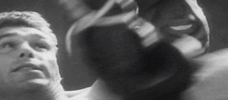
Stanley Kubrick’s Early Documentaries
1951-53 -

Fear and Desire
1953 -

Killer’s Kiss
1955 -
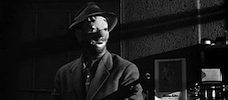
The Killing
1956 -
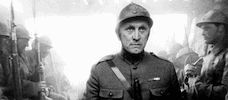
Paths of Glory
1957 -
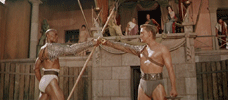
Spartacus
1960 -

Lolita
1962 -
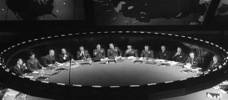
Dr. Strangelove or: How I Learned to Stop Worrying and Love the Bomb
1964 -

2001: A Space Odyssey
1968 -

A Clockwork Orange
1971 -

Barry Lyndon
1975 -

The Shining
1980 -

Full Metal Jacket
1987 -
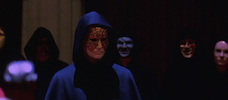
Eyes Wide Shut
1999 -

A.I.
2001
We don’t do comments anymore, but you may contact us here or find us on Twitter or Facebook.



